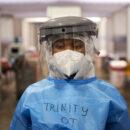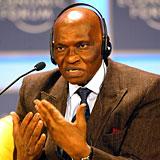Ellen Johnson Sirleaf: “Leymah Gbowee is too young to know what we’ve done to reach peace and security in our country” – By Magnus Taylor

Ellen Johnson Sirleaf, President of Liberia, combines a matriarchal exterior with a sophisticated economist’s intelligence. First elected in to office in 2006, she has headed a process of national renewal and economic reconstruction in a country that only recently dragged itself out of over 20 years of civil war.
The scale of the task required from President Sirleaf’s post-war government was starkly underlined by the “˜to do’ list outlined at an RAS Business Breakfast on Wednesday 31st October. Fundamentals, such as getting the financial and economic house in order…rebuilding relationships with the Bretton Woods institutions and sorting out the entire fiscal system, show that whilst the people of Liberia may have been ready and willing to start the rebuilding process, their institutions were in no fit state to tackle such a mountain.
President Sirleaf, as with most African leaders these days, speaks the positive, positive language of 6.5 percent growth rates and unexploited resource potential. Iron ore, diamonds and gold are all found in large quantities in the country. Rubber has also been produced for over 80 years at the Firestone plantation. President Sirleaf bemoans the fact that the country has never been able to add value to the production process – manufacturing products from an abundant primary resource, and consequently diversifying the economy beyond the relatively unprofitable commodities sector.
A huge infrastructure deficit is largely blamed for this. The deficit includes an underdeveloped road system making it difficult to transport materials and people around the country, to an over-stretched education sector. Whilst the country has what an optimist might describe as “˜a demographic dividend’, its rapidly increasing, youthful population requires opportunities in education and employment that Liberia currently struggles to provide.
“In 10 years Liberia should not be aid dependent”, says the President – a rather vague statement with no specific policy proscriptions to explain how this might be done. This is a pronouncement straight from the Paul Kagame school of Afro-positivism – decry the negative impacts of the aid industry whilst sweeping up the direct budgetary support sustaining your own government.
Liberia, following the end of its civil war, has enjoyed a large amount of international goodwill and the government of Johnson Sirleaf must be credited with creating a credible administration, capable of making a genuine attempt to fight poverty in this post-conflict state. However, to think that this assistance can be rendered obsolete within a decade is optimistic to the extreme
Liberia does, however, have a better shot at plotting a route to economic development than it did 10 years ago. As Johnson Sirleaf attests, political stability is fundamental to prosperity, and the country has enjoyed this since the middle of the last decade. This can also be said of the surrounding sub-region, the President indicating that increasingly close relations exists between the region’s leaders.
Johnson Sirleaf was, quite predictably, asked about corruption in her own country, a subject that has hit the headlines of late. It was a little disappointing therefore that she did not go in to detail on accusations levelled against her and her family in this regard. Whilst her rejection of such accusations was strong: “I stand by my record and the record of my family….we have vibrant society that produces rumour and innuendo” – she didn’t tackle specific instances of perceived nepotism with any substantive arguments. For example, the appointment of her sons to senior positions in her administration may be justified, but if so, the President should not be afraid to defend it.
Likewise, her verbal slapping down of fellow Liberian Nobel Laureate Leymah Gbowee, who recently accused her of not doing enough to combat corruption in Liberia, was a lesson in patient condescension: “she [Leymah Gbowee] is too young to know what we’ve done to reach peace and security in our country.”
Johnson Sirleaf’s statement that corruption would need to be fought “through both prevention and punishment” was at least a convincing framework for tackling the problem. Both improved systems (reducing discretionary decision-making) and strengthened institutions (creating “pillars of integrity” within the economy) were correctly identified as being fundamental to this task.
Whilst Johnson Sirleaf may not have all the answers, it would be hard to argue that there is a better person to run Liberia at this moment in time. She hopes that her legacy will be forging “the irreversible cause of peace and prosperity based on natural resources” in Liberia. It is difficult to be unimpressed by such ambition and determination.
Magnus Taylor is Managing Editor, African Arguments Online.







It is very obvious that Liberians are war weary. Not after almost two decades of brutality will one not subscribe to any measure to ensure stability in the country. In that regard one will not be surprised at the level of endorsement that the incumbent president of Liberia has received in recent time. Few days to the 2011 election in Liberia, I was in Monrovia for a field work research. I asked a woman who she was supporting in the election and why. Her answer was Ellen Johnson Sirleaf and the reason simply was for bringing a level of peace in the country.
It is very easy to sweep a lot of ills of an administration under the carpet just so that peace will reign. A very important question that needs careful answer is: how has the present regime worked to right the wrongs that in one way of the other precipitated the horrible civil wars in Liberia. For instance, at Loguato I engaged some locals in discussion about the state of affairs in the country and they complained about the continuous inequality between the Americo-Liberians and the native Liberians. Is there any truth in that? Does the same patronage politics that characterized the previous regimes still exist? What are the measures put in place to heal the wounds of division between and among various ethnic groups? In terms of infrastructural development, traveling from Monrovia to Ganta or Loguato to Ganta is a nightmare because of the condition of the roads. It hampers easy movement of persons and vehicle and is not good for the economy either. What is the government of Sirleaf Johnson doing about this? Is the pass mark the president has got just coming from external persons and bodies or has it translated to ordinary Liberians? How have the youths in Liberia been empowered to work for themselves and stop depending on the handouts they used to receive from warlords? Much as the president has contributed in bringing peace and stability in Liberia, it must not be forgotten that there is serious allegations that she also contributed in stoking the fire that razed down the country.
The significance of these issues is appreciated against the backdrop of the recent resurgence in the mineral resources in Liberia. And as we know very well the bane of African governments is the resource curse. The issue of corruption in the government must therefore be seriously looked into by the Madam president.
Participatory Democracy—A Deliberative Model to assist in the diminution of ‘corrupt practice’ entailing social state corruption which on any basis is socially corrosive lending to a breakdown in civil good order.
Most fundamentally, deliberative democracy affirms the need to justify decisions made by citizens and their representatives. Both are expected to justify the laws they would impose on one another. In a democracy, leaders should therefore give reasons for their decisions, and respond to the reasons that citizens give in return. But not all issues, all the time, require deliberation. Deliberative democracy makes room for many other forms of decision-making (including bargaining among groups), as long as the use of these forms themselves is justified at some point in a deliberative process. Its first and most important characteristic is its reason-giving requirement.
The moral basis for this reason-giving process is common to many conceptions of democracy. Persons should be treated not merely as objects of legislation, as passive subjects to be ruled, but as autonomous agents who take part in the governance of their own society, directly or through their representatives. In deliberative democracy an important way these agents take part is by presenting and responding to reasons or by demanding that their representatives do so, with the aim of justifying the laws under which they must live together. The reasons are meant both to produce a justifiable decision and to express the value of mutual respect. It is not enough that citizens assert their power through interest group bargaining, or by voting in elections. No one seriously suggested that the decision to go to war should be determined by a coin toss, or that it should be subject to a referendum. Assertions of power and expressions of will, obviously a key component of democratic politics, still need to be justified by reason.
A second characteristic of deliberative democracy is that the reasons given to the process should be accessible to all the citizens to whom they are addressed. To justify imposing their will on you, your fellow citizens must give reasons that are comprehensible to you. If you seek to impose your will on them, you owe them no less. This form of reciprocity means that the reasons must be public, not merely in the privacy of one’s mind. In this respect deliberative democracy stands in contrast to Rousseau’s conception of democracy, in which individuals reflect on their own what is right for the society as a whole, and then come to the assembly and vote in accordance with the general will.
The third characteristic of deliberative democracy is that its process aims at producing a decision that is binding for some period of time. In this respect the deliberative process is not like a talk show or an academic seminar. The participants do not argue for argument’s sake; they do not argue even for truth’s own sake (although the truthfulness of their argument is a deliberative virtue because it is a necessary aim in justifying their decision). They intend their discussion to influence a decision the government will make, or a process that will affect how future decisions are made. At some point, the deliberation temporarily ceases, and the leaders make a decision.
This continuation of debate illustrates the fourth characteristic of deliberative democracy—its process is dynamic. Although deliberation aims at a justifiable decision, it does not presuppose that the decision at hand will in fact be justified, let alone that a justification today will suffice for the indefinite future. It keeps open the possibility of a continuing dialogue, one in which citizens can criticize previous decisions and move ahead on the basis of that criticism. Although a decision must stand for some period of time, it is provisional in the sense that it must be open to challenge at some point in the future. This characteristic of deliberative democracy is neglected even by most of its proponents.
Deliberative democrats care as much about what happens after a decision is made as about what happens before. Keeping the decision-making process open in this way—recognizing that its results are provisional—is important for two reasons. First, in politics as in much of practical life, decision-making processes and the human understanding upon which they depend are imperfect. Therefore, we cannot be sure that the decisions we make today will be correct tomorrow, and even the decisions that appear most sound at the time may appear less justifiable in light of later evidence.
One important implication of this dynamic feature of deliberative democracy is that the continuing debate it requires should observe what we call the principle of the economy of moral disagreement. In giving reasons for their decisions, citizens and their representatives should try to find justifications that minimize their differences with their opponents. Deliberative democrats do not expect deliberation always or even usually to yield agreement. How citizens deal with the disagreement that is endemic in political life should therefore be a central question in any democracy. Practicing the economy of moral disagreement promotes the value of mutual respect (which is at the core of deliberative electoral democracy). By economizing on their disagreements, citizens and their representatives can continue to work together to find common ground, if not on the policies that produced the disagreement, then on related policies about which they stand a greater chance of finding agreement.
Combining these four characteristics, we can define deliberative democracy as a form of government in which free and equal citizens (and their representatives), justify decisions in a process in which they give one another reasons that are mutually acceptable and generally accessible, with the aim of reaching conclusions that are binding in the present on all citizens but open to challenge in the future. We can further refine it is meaning and defend it is claims by considering to what extent deliberative democracy is democratic; what purposes it serves; why it is better than the alternatives; what kinds of deliberative/participatory democracy are justifiable; and how its critics can be answered.
Monte McMurchy
The international community forced this imperial Presdient on the Liberian society. Leymah is the only one with guts to stand up to her. Leymah is young and it is the young that have the fierce fire to demand change. And unlike those sycophantic women , Leymah does not need handouts from teh government.